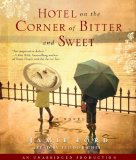Hotel on the Corner of Bitter and Sweet: A Novel, by Jamie Ford (Read by Feodor Chin)
When the parasol with the brightly painted koi is brought up from the basement of the Panama Hotel, Henry Lee, a middle-aged Chinese-American Seattle native, flashes back to a lifetime of memories centered around the newly renovated hotel. Situated between Seattle's Chinatown and Nihonmachi, or what used to be Japantown before thousands of residents were removed to internment camps, the Panama Hotel is the only remaining testament to the once thriving pre-World War II Japanese-American community. Found in the basement are numerous boxes, suitcases and trunks, the abandoned treasures of 37 families who were forced to leave their homes. The discovery of the parasol leads to Henry's quest to locate a rare Oscar Holden 78 RPM jazz recording that even music lovers doubt ever existed. When the record is found, it is broken, but it proves that Henry had not imagined its existence. Freed from feelings of guilt or betrayal with his wife's recent death, Henry allows himself to remember Keiko, a Japanese-American girl and his first true love. Keiko Okabe's family had been sent to internment camps during World War II, and although Henry pledged to wait forever for Keiko's return, that was not to be. Encouraged by his old friend Sheldon, a jazz musician who on seeing the record urges him to "put the pieces together," Henry begins the process of healing old wounds and building a new life.
Jamie Ford's story of the discovery of the belongings of Japanese-American families who were subjected to internment during World War II is not only informative; it's a beautiful love story. He provides a wealth of information about both Chinese and Japanese-American cultures of the era and how those two groups that the mainstream American population lumped together and labeled "Asian" interacted with Caucasians and with each other. "I am Chinese" proclaims the button that Henry's father forces him to wear to let the world know that this 12-year-old boy is not the hated enemy when he sends him to an all-white school. Tormented by his schoolmates, Henry is lonely and miserable until he meets Keiko and sees how she and her family find beauty in everyday life. In telling his story, Ford also describes the Seattle jazz scene before and after the war, showing how the music bridged cultural barriers. Exquisite narration by Feodor Chin gives distinctive voices to a wide range of characters, Chinese, Japanese and African-American. He is able to convey the subtle vocal difference between the characters, both traditional and modern, youthful and aged.
The title, Hotel on the Corner of Bitter
and Sweet, reminds listeners that in order to appreciate
the sweet, one has to experience the bitter as well.
This beautiful book, told in lyrical prose and packed
with important historical insights, is a perfect book
for so many kinds of listening. It can be enjoyed by
listeners from 10 to 100 and would be ideal for solitary,
group or family listening. Because it deals with cultural
differences and how Americans were impacted by the existence
of internment camps, it lends itself to discussion.
When Henry questions Mrs. Okabe about her family's willingness
to submit to the horrors of internment, she explains
that "We are Americans first, and this is how we
show our loyalty." Because it deals with how we
are affected by the people we love, it is invites introspection
and recollection. Highly recommended.
Ruth
Mormon
3/2/09

